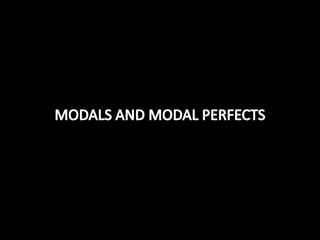
Keep Calm and Learn Modals: A Guide to Modals and Modal Perfects
- 4. MODALS Modals are used to express things like ability, possibility and prohibition. The modals include: l can/be able to l could l may/might l should/ought to l must/have to l don’t have to/needn’t l mustn’t After a modal, we use the base form of the verb. She can sing beautifully. modal base form l would
- 6. MODALS The modals can and be able to express ability and possibility. Be able to can be used in different tenses. Can you play the piano?/ Are you able to play the piano? He can come to my party. / Will he be able to come? Can also expresses request and permission. We also use the modal can to express suggestion. Can we make a cake for Marina’s birthday? Can we take a taxi? Yes, you can.
- 7. MODALS You can’t use your mobile phones in class. Can’t also expresses certainty that something is impossible, disbelief and deduction. This can’t be the right house – there’s nobody there. Can’t expresses inability. Be able to can be used in different tenses. I can’t speak to you later. I won’t be able to speak to you later. We use can’t to express prohibition.
- 8. MODALS Temperatures could increase in the next few days. Could can be used to make a polite request and a polite suggestion. Could you close the door when you leave, please? We could go to the theatre on Friday. Could expresses past ability. Be able to can also be used in the past. When I was young, I could play the violin. When I was young, I was able to play the violin. We use could to express possibility.
- 10. MODALS May I offer you something to drink. May I go to the toilet, please? May and might express possibility. I may visit Carla when I’m in Boston. I might go to the cinema tomorrow, but I’m not sure. May can also be used to make a polite request and when you ask for permission.
- 12. MODALS May I offer you something to drink. May I go to the toilet, please? Should and ought to express advice. You should study very hard for the exams. You ought to go to the doctor if you have fever. May can also be used to make a polite request and when you ask for permission.
- 14. MODALS The modals must and have to express obligation. Have to can be used in different tenses. I must finish my homework before watching TV. You have to pay the mortgage every month. Must expresses certainty that something is true. Mustn’t expresses prohibition. You mustn’t send text messages while you drive. It must be difficult to become a famous singer.
- 16. MODALS The modals don’t have to and don’t need to express lack of obligation/necessity. You don’t have to finish your projects this week. You don’t need to finish your projects this week. Needn’t is used in more formal situations. It also expresses lack of obligation/necessity. You needn’t be afraid of me. I want harm you.
- 17. WOULD
- 18. MODALS We use would to make a formal request. Would you mind passing me the salt, please? Would is also used to make an offer. Would you like to eat a pizza?
- 19. NOW…
- 22. MODAL PERFECTS Modal perfects are used to comment in various ways on things that happened or didn’t happen in the past. The modal perfects include: l could have l couldn’t have l may/might have l must have l should/ought to have l would have l shouldn’t have After a modal perfect, we use the past participle. I should have studied harder for the test. modal base form l needn’t have
- 24. MODAL PERFECTS The modal perfect could have expresses possibility to have done something in the past which in fact wasn’t done. He could have bought that house, but he didn’t.
- 26. MODAL PERFECTS The modal perfect couldn’t have expresses certainty that something is impossible, that something didn’t happen. You couldn’t have seen Pablo yesterday – he’s on holiday in San Francisco.
- 28. MODAL PERFECTS The modal perfects may have and might have express possibility that something was true. I may have upset Carme – she hasn’t spoken to me for days. I might have upset Carme but I’m not really sure.
- 30. MODAL PERFECTS The modal perfect must have expresses certainty that something was true. She must have been a beautiful baby.
- 32. MODAL PERFECTS The modal perfects should have and ought to have express criticism or regret after an event. You should have told me the truth. You ought to have told me the truth.
- 34. MODAL PERFECTS The modal perfect shouldn’t have express criticism or regret after an event. You shouldn’t have spent so much money.
- 36. MODAL PERFECTS Would have expresses willingness to do something that could not be done. I would have called you, but I was in a meeting all day.
- 38. MODAL PERFECTS The modal perfect needn’t have expresses an unnecessary past action. You needn’t have bought me a gift.